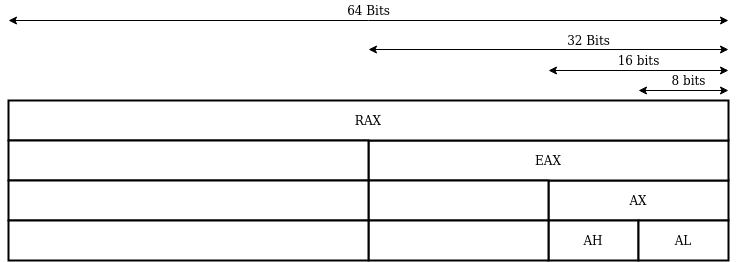x86-64 Assembly Language
Prerequisite: Knowledge about simple programming language terms like variables, functions etc.
Registers
ASM works a lot around registers, I try to think of them as variables which only store data types up to 8 bytes.Now there are special registers and register for general use.
In the start (during 8 bit days) we only had 4 general purpose registers - a,b,c,d.
And Other 2 special purpose registers - sp (stack pointer) and bp (base pointer).
But now (in 64 bit mode) we have a total of 11 general purpose registers and 4 special purpose registers:
| Register | Purpose |
|---|---|
| rax | General Purpose Register |
| rbx | General Purpose Register |
| rcx | General Purpose Register |
| rdx | General Purpose Register |
| r8 | General Purpose Register |
| r9 | General Purpose Register |
| r10 | General Purpose Register |
| r11 | General Purpose Register |
| r12 | General Purpose Register |
| r13 | General Purpose Register |
| r14 | General Purpose Register |
| r15 | General Purpose Register |
| rsp | Special Purpose Register |
| rbp | Special Purpose Register |
| rsi | Special Purpose Register |
| rdi | Special Purpose Register |
In above registers ‘r’ means 64 bit register. If we want to use 32 bit register we use ‘e’ prefix. We can also use 32/16/8 bit registers in 64 bit mode . The following illustration will explain it clearly :

Syscall
Behind the working of every program, there are syscalls involved; These syscalls are permissions which the program ask for from the “supreme authority” - the kernel. Now why this happens ? Because the program does not directly run in the privileged mode for security reasons.
In C language we have glibc that provide us functions like printf, scanf etc. which performs syscalls for us in the background.Now before making a syscall we have to set some parameters to define the syscall and its behaviour. We define the syscall using “codes”, for example write syscall has code 1 in x86-64. Now write takes 3 arguments: fd(file descriptor we have to write), buf (stuff we have to write), and count (How many characters to write). How do we know this ? using man 3 write which return the man page of write.
We set these arguments using different register and all this follows a calling convention. The calling convention is as follows:

To get a list of all the syscalls : cat /usr/include/x86_64-linux-gnu/asm/unistd_64.h We don’t need to remember this path. I mean if you ever forget this path simply investigate this using other techniques like preprocessor output and printing predefined standard macros like this: echo SYS_write | gcc -include sys/syscall.h -E - here we are just asking the compiler to return the preprocessor output to stdout.
That’s all folks. In next article we’ll write our first assembly program.